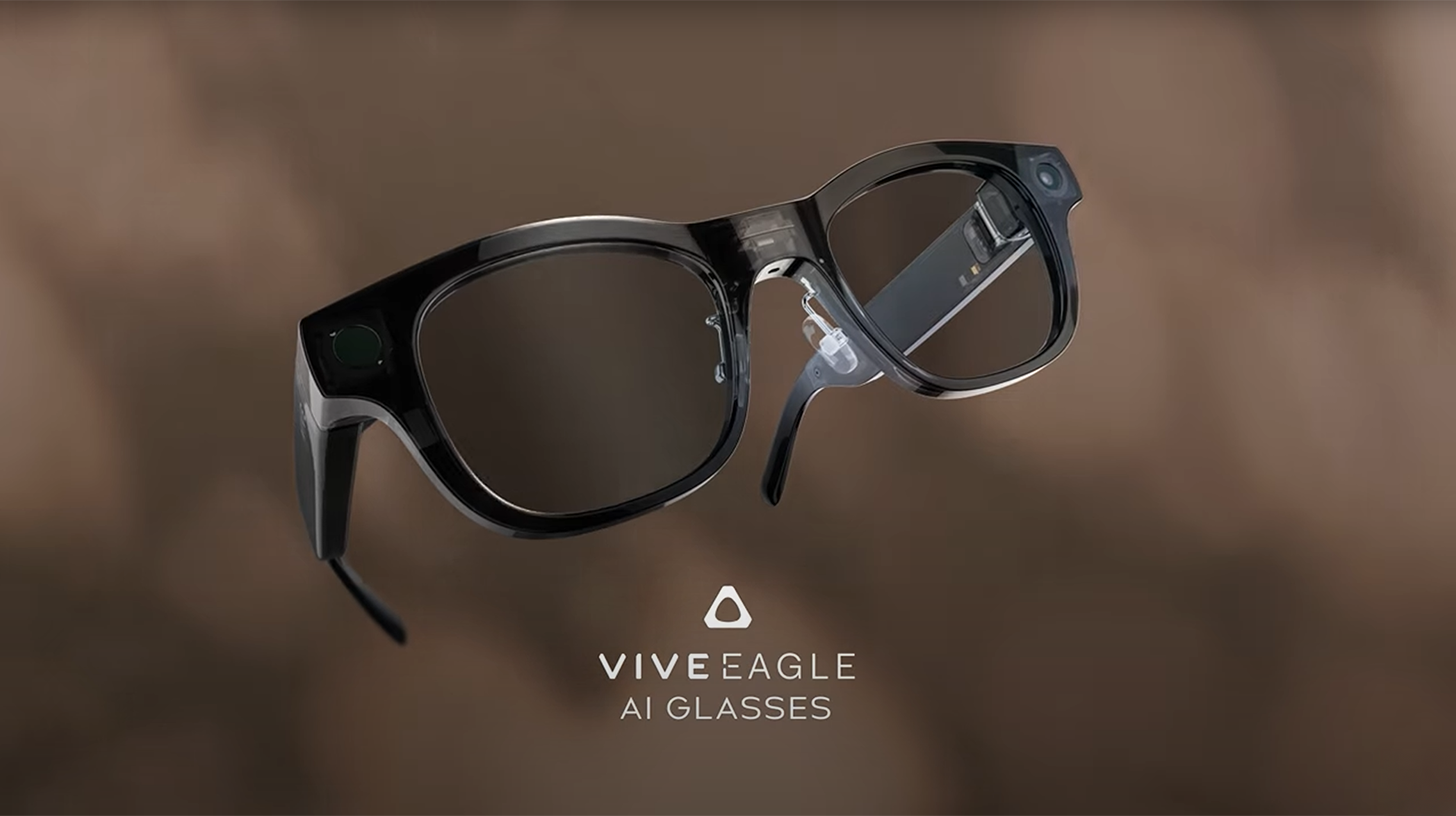The anti-meta glasses are here: Why HTC's VIVE Eagle really protects your data
### HTC returns: These smart glasses with ZEISS lenses challenge the market ### Stay away from Meta's glasses? HTC offers an exciting alternative – with a big catch ### Lighter, smarter, more private: This is what HTC's new VIVE Eagle can really do ### The next smartphone killer? HTC enters the booming AI glasses market with the VIVE Eagle ###
HTC's new AI glasses rely on a crucial detail that changes everything
HTC's re-entry into the smartglasses space marks a remarkable transformation for the Taiwanese company, which was once considered a major player in the smartphone segment and later became known as a pioneer of virtual reality technology. With the VIVE Eagle, HTC is strategically positioning itself in one of the fastest-growing technology segments and directly competing with established market leaders.
The rise of AI-powered smart glasses
The global smart glasses market is currently experiencing unprecedented growth that is fundamentally transforming the industry. After years of stagnation and failed predecessor models like Google Glass, smart glasses are finally reaching the mass market. The integration of artificial intelligence has proven to be a key factor in this breakthrough.
Market growth is impressive: The first half of 2025 recorded growth of 110 percent, while global sales growth of 210 percent was already reported for 2024. The market size for smart glasses is estimated to be between $878.8 million and $5.98 billion in 2024. Market researchers forecast values between $4.13 billion and $8.26 billion for 2030. These exceptional growth rates demonstrate that smart glasses are outgrowing their niche and becoming an important segment of consumer electronics.
Particularly noteworthy is the triumph of AI-based smart glasses: They accounted for 78 percent of all shipments, up from 46 percent in the first half of 2024. The AI segment even grew by over 250 percent, outpacing the already strong overall market growth.
HTC's strategic realignment
The company, which reinvented itself after selling its smartphone division to Google in 2017, initially focused on virtual reality with the successful VIVE series. Now, HTC is expanding its portfolio into augmented reality and AI-powered wearables. This transformation from a smartphone company to a VR and AR pioneer seems to be a done deal.
The announcement of the VIVE Eagle on August 14, 2025, and its planned launch in Taiwan on September 1, 2025, demonstrate HTC's commitment to establishing itself in this rapidly growing segment. Chris Huang, Senior Vice President of HTC, emphasized that the VIVE Eagle represents HTC's latest exploration in smart living and personal wearables.
The VIVE Eagle in detail
Hardware and design
The VIVE Eagle is distinguished by its carefully designed hardware. Weighing less than 49 grams, the headset remains comfortable even during extended wear. The design is deliberately inspired by everyday eyewear to promote widespread acceptance. Adjustable nose pads and ergonomically shaped temples ensure optimal comfort.
High-quality ZEISS sunglasses lenses provide UV protection while still allowing clear vision. This partnership with the renowned optics specialist underscores HTC's commitment to developing a premium product. The glasses are available in four color options: Berry, Black, Coffee, and Gray.
Technical equipment
At the heart of the VIVE Eagle is the Qualcomm Snapdragon AR1 Gen 1 processor, combined with 4 GB of RAM and 32 GB of internal storage. This hardware configuration provides ample performance for the various AI applications and AR features. The headset features Wi-Fi 6E and Bluetooth 5.3 connectivity and is compatible with iOS 17.6+ or Android 10+ smartphones.
A special feature is the integrated 12-megapixel ultra-wide-angle camera, which captures photos at a resolution of 3,024 × 4,032 pixels and videos at 1,512 × 2,016 pixels at 30 frames per second. This camera not only enables content capture but also serves as an input device for the AI functions.
Audio system and interaction
The VIVE Eagle's open-ear audio system utilizes large drivers combined with virtual bass enhancement to produce rich and clear sound. This design allows users to listen to music or take calls while still remaining responsive, as ambient noise isn't completely blocked out.
Interaction occurs primarily through the VIVE AI voice assistant, which is compatible with platforms such as OpenAI and Google Gemini. Users can take photos or videos using voice commands and have content translated in real time into a total of 13 languages.
Battery life and charging
The VIVE Eagle is equipped with a 235 mAh battery that delivers up to 36 hours of standby time or approximately 4.5 hours of continuous audio playback. Phone calls last approximately 3 hours. The magnetic fast-charging port allows you to reach approximately 50 percent of battery capacity in just 10 minutes and 80 percent in 23 minutes.
Privacy and security
HTC's approach to data protection differs significantly from its competitors. The company consistently relies on local storage of all user data, secured by AES-256 encryption. This military-grade encryption ensures the highest security standards.
A small LED signals active recording and automatically stops recording as soon as the glasses are removed or the display is covered. These transparency features address growing concerns about privacy and unauthorized recording in public spaces.
🗒️ Xpert.Digital: A pioneer in the field of extended and augmented reality
Made in Taiwan: How HTC is shaking up the smart glasses market – HTC's reboot against Meta's dominance
The competitive smart glasses market
Meta's market dominance
Meta currently dominates the smart glasses market with an impressive 73 percent market share in the first half of 2025. Ray-Ban Meta AI Glasses recorded year-on-year growth of over 200 percent. Meta has ramped up production capacity through its partner Luxottica and plans to increase annual production to 10 million units by the end of 2026.
The success of Ray-Ban Meta Glasses is also reflected in sales figures: They were the best-selling models in 60 percent of EssilorLuxottica stores in Europe, Africa, and the Middle East in the third quarter of 2024. By 2023, around two million Ray-Ban Meta glasses had already been sold.
Chinese competition
The smart glasses market is increasingly being driven by Chinese manufacturers. Xiaomi introduced its first AI-powered smart glasses in June 2025. The glasses cost 1,999 yuan (approximately €240) and offer an impressive battery life of 8.6 hours and 45 minutes of continuous video recording. These specifications significantly exceed Meta's offering, as the Ray-Ban Meta Glasses only support a video length of three minutes.
Rokid has developed the Rokid Glasses in partnership with eyewear brand Bolon. These 49-gram glasses are powered by Alibaba's Tongyi Qianwen AI model and support object recognition, language translation, and health reminders. They are priced at 2,499 yuan (approximately $345), with a planned market launch in the second quarter of 2025.
TCL, with its RayNeo brand, unveiled the X3 Pro AR glasses, which are considered possibly the best AR glasses in the industry. They feature a color display with Micro-LED technology and a brightness of 2,500 nits, allowing content to remain visible even in bright sunlight.
HTC's competitive position
Differentiation through data protection
HTC's greatest competitive advantage may be data protection. While Meta recently started storing voice recordings on its glasses for AI training by default, with no option to turn this off, HTC is taking a radically different approach. All user data remains local to the device and is not uploaded, tracked, or used to train AI models. Even when using third-party AI for queries, user data is anonymized.
Technical specifications in comparison
At 48.8 grams (with lenses), the VIVE Eagle is in line with its competitors. Its battery life of 4.5 hours for music playback is competitive, but can't match Xiaomi's 8.6 hours. The 12-megapixel camera is industry-standard, and support for 13 languages for real-time translation is comprehensive.
Price positioning
With a starting price of approximately €440, the VIVE Eagle is positioned in the mid-price segment. This is comparable to the Ray-Ban Meta Glasses, but more expensive than Xiaomi's €240 offering. The price reflects the premium components, such as the ZEISS lenses, and the high-quality workmanship.
Market outlook and future prospects
Technological developments
The next generation of smart glasses is expected to offer even more powerful AI capabilities. Local processing of large language models (LLMs) will enable faster response times and better data protection. Features such as real-time translation, context-aware AR, and even emotion recognition will further enhance the user experience.
Expanding Ecosystem
Meta plans to expand its smart glasses portfolio to include Oakley glasses for sports-oriented users and Prada models for the luxury segment. This diversification demonstrates the importance of design partnerships for market acceptance.
Regulatory challenges
Europe has strict data protection regulations that limit the functionality of some smart glasses. Meta has already disabled some features on its Ray-Ban glasses that are available in the US and UK. HTC's privacy-focused approach could be an advantage here.
HTC's opportunities and challenges
Strengthen
HTC's long-standing experience in VR gives the company valuable expertise in developing wearable technology. The partnership with ZEISS for optics and the company's focus on data protection could be important differentiators. Integration with established AI platforms such as OpenAI and Google Gemini offers flexibility for users.
challenges
The biggest drawback is its initial limited availability in Taiwan. Unlike other VIVE products, which are sold globally, it's unclear when the VIVE Eagle will be available internationally. This could significantly limit HTC's market opportunities, especially since its competitors are already operating globally.
Meta's strong market position with a 73 percent market share represents a significant hurdle. HTC's return to the consumer market after years of focusing on B2B VR solutions could prove difficult.
Immersive technology made in Taiwan: HTC's daring relaunch
HTC's entry into the smart glasses market with the VIVE Eagle demonstrates the company's potential to establish itself in a rapidly growing technology segment. The combination of high-quality hardware, a privacy-focused approach, and proven VIVE technology could give HTC a competitive advantage.
The smart glasses market is on the cusp of a significant breakthrough, driven by advances in AI technology and growing consumer adoption. HTC's timing for re-entering the consumer market appears optimal, although its initial focus on Taiwan may limit its global impact.
The VIVE Eagle represents more than just a new product—it symbolizes HTC's transformation from a former smartphone manufacturer to an innovative provider of immersive technologies. Success will depend on whether HTC can combine its technical expertise with effective marketing and global availability to compete against established competitors like Meta.
We are there for you - advice - planning - implementation - project management
☑️ SME support in strategy, consulting, planning and implementation
☑️ Creation or realignment of the digital strategy and digitalization
☑️ Expansion and optimization of international sales processes
☑️ Global & Digital B2B trading platforms
☑️ Pioneer Business Development
I would be happy to serve as your personal advisor.
You can contact me by filling out the contact form below or simply call me on +49 89 89 674 804 (Munich) .
I'm looking forward to our joint project.
Xpert.Digital - Konrad Wolfenstein
Xpert.Digital is a hub for industry with a focus on digitalization, mechanical engineering, logistics/intralogistics and photovoltaics.
With our 360° business development solution, we support well-known companies from new business to after sales.
Market intelligence, smarketing, marketing automation, content development, PR, mail campaigns, personalized social media and lead nurturing are part of our digital tools.
You can find out more at: www.xpert.digital - www.xpert.solar - www.xpert.plus


